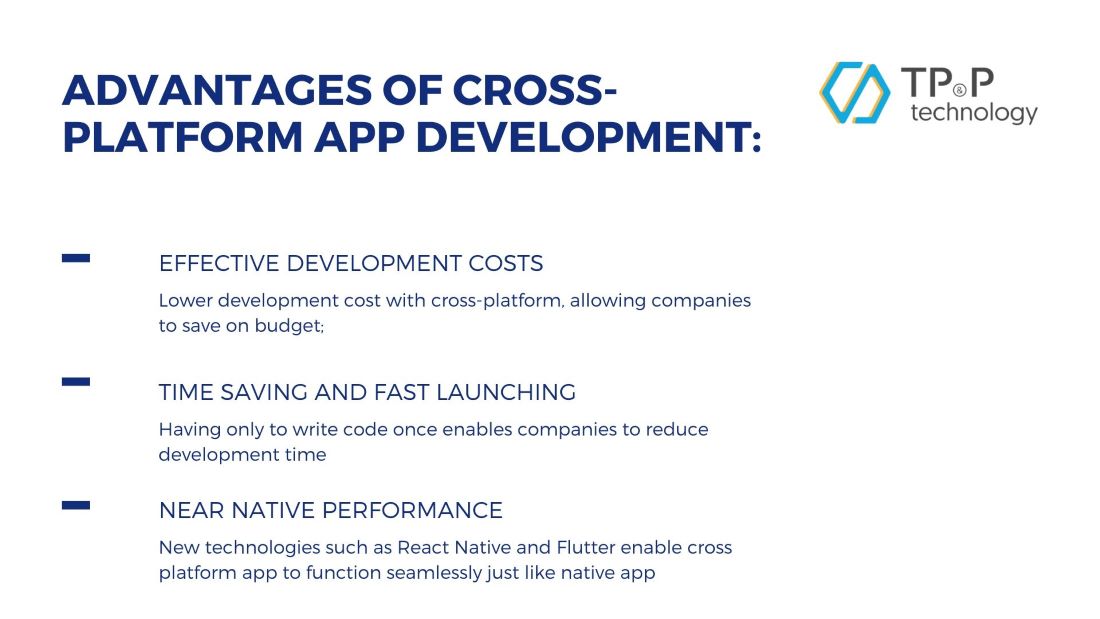
For particular businesses such as startups or SME (small-medium enterprises), developing a mobile application is among the most important steps for their business direction.
This is especially true when the entire business model of these organizations is based on mobile applications.
Offering products and services through mobile app provides convenience and meeting all the demands required by consumers.
A mobile application can definitely make all the difference for newly launch businesses, especially when it’s the main channel for those organizations to interact and engage with their customers.
Moreover, mobile app helps generate or increase the revenue stream and establish brand awareness for those newly launched companies.
Essentially, mobile application can provide a lot more advantages for businesses, the opportunities are virtually endless. Thus, it’s highly important that business owners pay particular attention to their mobile development project to ensure quality, taking their business to the next level.

In this article, we examine the reasons why many businesses should turn to outsourcing for their various mobile app requirements, especially cross-platform mobile app development.
Advantages of cross-platform app development:

Compared to native solution, cross-platform app development - where mobile developers only have to write one codebase for both mobile platforms (iOS and Android) - provides companies, especially SMB (small-medium businesses) and startups, the following advantages:
- Effective development costs: native development requires developers to write separate code bases for each platform (iOS and Android) leading to a double of effort and resources. On the contrary, cross-platform developers only need to write the code base once and then publish the app to both platforms simultaneously. This translates to a lower development cost for cross-platform development, allowing companies to save on the budget.
- Time-saving and fast launching: having only to write code once enables companies to reduce development time, quickly launching their product into app marketplace, and able to capture the valuable market share of early users.
- Near-native performance: thanks to new technologies such as React Native and Flutter, cross-platform app can now function seamlessly just like native app, providing users with a highly pleasant app experience together with a close to native UI/UX.
Software Development: In-house vs. Offshore Outsourcing
There are quite a number of choices for business organizations when it comes to cross-platform app development. The three most popular options among those are:
- Hire freelance cross-platform app developers;
- Establish an in-house team of developers;
- Hire a cross-platform app development company;
Many organizations believe that hiring an in-house team of developers for their cross platform mobile app project is the most effective way to get the job done, and this model will help them save cost compared to hiring a freelancer or app development company.
However, this is not entirely true - in many cases, in-house development might actually cost a lot more than outsourcing. Let’s consider each option separately as follow:
#1 In-house Development:
As mentioned above, it is a popular choice for many companies and startups to establish an in-house team of developers to build their products from scratch.
In-house development is especially suitable for mid-sized companies or corporations which build large scale enterprise products with highly complex business logic, requiring regular collaboration between the mobile development team and other departments.
With this model, business owners or founders need to allocate adequate resources to hire experienced and skilled cross-platform app developers as well as other tech staff.
However, for small businesses or newly launched startups that are in urgent need of launching their product fast, in-house development could prove to be ineffective and unable to meet the requirement of fast launching to capture the early market share.
Let’s consider both the advantages and disadvantages of in-house development, as follows:
Pros:
- Full control and direct management over the app development process;
- No communication barriers and/or geographical distance;
- Opportunities for team collaboration and cross-team support;
- Ease of maintenance.
Cons:
- Higher cost and longer development time: Hiring in-house team of developers could seem like the most effective way to get the job done. However, the time and resources needed to hire the whole team of developers, designers, QA and testers, and project managers could prove to be considerably higher than expected. Not only businesses will need to go through the time-consuming hiring process but finding the candidates with the right skills for the project could be equally challenging - considering qualified mobile developers usually command high salary due to shortage of IT professionals. Starting the project from scratch with no experience is a lot more disadvantageous than hiring developers who are already experienced and can get the job done more efficiently at a similar or lower cost.
- Lack of experience: Since cross-platform app development is still relatively new, finding local developers who are experienced with cross-platform technologies could be quite difficult. Combined with the shortage of IT talents, hiring IT team of developers with no experience in cross-platform development can exacerbate this issue even more.
- Amateur-level app: Companies may seek to hire experienced cross-platform developers to train other junior developers for their projects, but the quality could hardly be the same or performed well on a large scale - especially with a highly complex project.
Here, the cons of in-house development can easily outweigh the benefits provided, especially considering the requirement of quick launching and if the app development project is a one-time thing with budget limitation.
Outsourcing Cross-Platform App Development:
With cross-platform app outsourcing, the two most common options are to either hire freelance developers or app development companies.

Freelancers:
Freelancers are quite a popular option for cross-platform development, and it’s relatively easy to hire one who’d build a cross-platform app for you.
The freelance model works well for businesses that already have the project in place and looking to hire freelancers to complete a project with a set of requirements and time-frame.
Additionally, hiring freelancers is usually cheaper compared to other options, and businesses do not have to pay to freelancers when the work ends.
However, freelance cross-platform developers won’t be the best option in case the project requires long-term collaboration.
Also, they can’t work closely and collaborate with other developers if needed and more importantly, there’s no guarantee that they will finish the project or not abandoning it if stuck. Thus, this cheapest option might as well be the riskiest one. Businesses should take great caution and carefully review freelance cross-platform developers’ portfolios, ask about their expertise before hiring one.
Hiring Cross-Platform App Development Agencies:
The advantage of hiring external agencies for your cross-platform app development needs is that they can take on your project regardless of the size and complexity.
Yet, companies need to be aware of the fact that some agencies that only target the big corporations, and usually provide their development services at a higher rate, even for small scale projects.
Thus, these agencies are usually not the best option for startups or small-medium businesses. There are offshore software development companies that are more suitable for start-ups and SMB.
Looking for a reliable Cross-Platform Mobile App Development Partner? Contact us today!
Another advantage of hiring external agencies is that their team can collaborate and work as an extension of your existing in-house team, enhancing the capacity, regardless of the stage of the project.
Why outsourcing cross-platform app development?
- Team of Mobile Experts: outsourcing cross-platform app development to an offshore company means companies will have access to a team of mobile experts working on their project, varying from mobile/cross-platform developers, project managers, UX & UI designers, QA and mobile testers, etc. all of whom with experiences in the cross-platform app development project.
- Advanced and innovative technologies: Mobile app development companies are highly equipped with the right tools and advanced technologies (e.g. Machine Learning, Blockchain, etc.) to develop cross-platform apps for businesses on a large scale. At TP&P technology, our mobile team always keeps up to date with the new cross-platform technologies such as Flutter and React Native as well as other best practices to ensure app quality and high-level performance.
- Effective development costs: for the many businesses that are not in the IT industry or only looking to develop their cross-platform app as a one-off project, it would be a much cheaper option to hire a skilled app development company than paying monthly salaries to a whole in-house team. Ultimately, outsourcing allows businesses to achieve a better quality app at a lower price.
Cross-Platform App Development Costs:
Even though hiring mobile app development companies is among the safest choices when developing cross-platform app, they can also become quite expensive due to various reasons.
For example, some app development companies will only take on projects with a minimum size of $5000 and upward. Furthermore, some agencies can charge upward of $250/hr, and given the number of months it takes to develop a cross-platform app, the overall costs can easily top in-house option.
If your business is a newly established one (e.g. startup) with budget limitation, it’d be better to look for offshore agencies that are suitable to your specific mobile needs and get an estimate from them in advance in order to choose the best one.
Conversely, the cheapest option may compromise in quality, so it’s important that businesses carefully research the market before finalizing on one.
As a general rule, the overall cross-platform app development cost will largely depend on the scale and complexity of the projects. Additionally, there are other factors that can increase the development costs such as app security and performance enhancements, requirements of advanced technologies/frameworks, etc. Hence, consideration should be given to address these issues ahead of finalizing the outsourcing contract.
Top 5 things to consider when looking for an app development agency
There are certain things that business owners need to keep in mind when looking for an outsourcing development company.
To begin with, it’s important to make sure that the team is good at what they do. The ultimate objective is to hire a qualified mobile development app company that can help you build a quality app and stay within budget.
- Review portfolios: the first thing to do is to check out the previous cross-platform app developed by your potential outsourcing partner. In particular, do ask to download the app from the Apple App Store or Google Play to test the look and feel, as well as the performance of the app. If you don’t like what you see then it’s probably time to look elsewhere.
- Communication: this is the critical factor that affects the overall success of your app project. Offshore software development companies usually work on different time-zone with customer companies, and together with the language barrier, which might lead to difficulties in following up with project progress. Therefore, it’s important to find out and agree in advance the communication methods (e.g. Skype, Zoom, etc.) and schedule (e.g. daily, weekly).
- Interview developers: directly interviewing each member of the development team - including mobile developers and project managers - is a good way to verify if the team possesses the expertise and experience required to take on your project. Also, you will also be able to find out if their English skills are sufficient for the communication requirements of the project.
- Get a free quote: knowing how much your app will costs, even approximately, will provide you with the information needed to prepare and allocate adequate resources on your project.
- Request a timeline of execution and the milestones of your project: so that you know where your project stands and follow up accordingly.
Building a cross-platform app is not an easy process; it is time-consuming and may cost a lot.
By choosing the right app development partner, businesses such as startups or small-medium sized enterprises can benefit a great deal from it.
Aside from lower development costs, cross-platform app development outsourcing allows business to speed-up their product’s time-to-market, while enabling app owners to focus on other important areas of their businesses, ultimately enhancing productivity.
Contact TP&P Technology today for professional assistance in cross-platform app development. Our team of mobile experts are ready to help with any stage of your mobile app product lifecycle.



